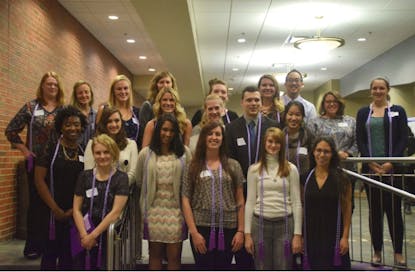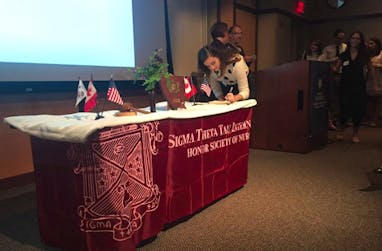Sigma Theta Tau Inducts UR Students, Nurse Leaders
By Jessica O'Leary
Friday, November 18, 2016
Nearly 100 University of Rochester School of Nursing students and nurse leaders in the community were inducted into the Epsilon Xi Chapter of Sigma Theta Tau International, the honor society of nursing, on Nov. 14.
“This is a big day for you,” Rebecca Johnson, BS, RN, CCRN, PCCN, treasurer of the Epsilon Xi Chapter, told the new inductees to start off the event. “You’re becoming a part of an institution that’s been around since 1922 and has a long tradition of celebrating nursing service. This is the start of your journey with Sigma, and I encourage you to stay involved and help make a difference as you start your nursing careers.”

With more than 135,000 active members in 90 countries, Sigma Theta Tau is dedicated to improving the health of people worldwide through increasing the scientific base of nursing practice. The Epsilon Xi Chapter, founded at the UR School of Nursing in 1979, is committed to supporting nursing through scholarships, co-sponsorship of conferences, and other activities.
To become a member of Sigma Theta Tau, undergraduate students must rank in the upper 35 percent of their class and carry a 3.0 grade point average. Graduate students must have a 3.5 grade point average, while nurse leaders require a baccalaureate degree and demonstrated achievement in nursing.
“Being inducted into Sigma Theta Tau is like the icing on the cake after a year of hard work. The accelerated program is so challenging and fast-paced, so it is nice to be recognized for my academic achievements,” said Angie Palomaki, who will graduate in December. “This organization connects me to many nurses who are all at different points in their careers, which is an invaluable resource as I'm starting my own career as a new nurse.”

The chapter also awarded three scholarships at the event. Mary Starks, a student in the accelerated bachelor’s program for non-nurses, received the undergraduate scholarship award. The award recognizes an undergraduate nursing student who demonstrates academic success as well as leadership potential and strong interpersonal skills. Starks, who will graduate in May 2017, plans to work in cardiac care.
Her long-term goal is to earn her Doctor of Nursing Practice degree and provide preventative care and health education to patients. During her time at the UR School of Nursing, Starks has participated in the student perspective panel during the immersion program for new students and has volunteered for several other academic committees.
Corinna Romantic, BS, RN-BC, CPHON, a student in the pediatric nurse practitioner program, received the graduate scholarship award, which recognizes a student who demonstrates academic success in graduate studies and exemplifies leadership qualities.
“Corinna is hard working, eager to learn, and a professional role model to her peers. She exhibits a positive ‘can-do’ attitude and exemplifies the intrinsic qualities of a nurse in her caring, respectful, and thoughtful approach towards patients and families,” said Shannon Moreland, RN,  DNP, FNP, CEN, president of the Epsilon Xi Chapter. “Corinna is committed to providing evidence-based care and is always challenging herself to use best evidence to support her clinical decision-making.”
DNP, FNP, CEN, president of the Epsilon Xi Chapter. “Corinna is committed to providing evidence-based care and is always challenging herself to use best evidence to support her clinical decision-making.”
Jennifer Mammen, PhD, NP-C, a postdoctoral fellow, received the research grant award, which is presented annually in recognition of a nurse who has proposed a research project of high quality that demonstrates the individual’s future promise as a nurse scientist. Mammen was recognized for her research project titled, “Technology Enabled Asthma Management Systems Pilot Study.” As part of the project, Mammen is evaluating the feasibility, acceptability, and preliminary efficacy of a multilevel, patient-centered, technology-enabled asthma management system for young adults.
“Jennifer’s research is well-suited to the Sigma honor society because it is a practice-based intervention that has the ability to dramatically impact the way we deliver care. It is patient-focused, emphasizes evidence-based practice, and capitalizes on the use of nursing to improve chronic condition management and health outcomes,” said Moreland. “This study holds tremendous promise of developing evidence that will impact the way we deliver care.”
Learn more about the Epsilon Xi Chapter of Sigma Theta Tau International.

